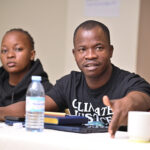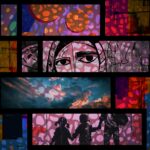This article was published more than 4 years ago.
In recent months, Nigeria’s #EndSARS protests have captured the world’s attention. The successful movement to disband the notorious Special Anti-Robbery Squad (SARS) has mobilized millions to march against police brutality—and the ensuing violent crackdowns have left scores of people wounded or dead.
As founder of the Fund-supported nonprofit Spaces for Change (S4C) and secretariat of the Action Group on Free Civic Space—a coalition of more than 60 organizations working to defend activists in Nigeria—Victoria Ibezim-Ohaeri knows firsthand what the country’s security forces are capable of.
For months, she’s been part of a team fighting to end abuses perpetrated by these same state agents during the country’s COVID-19 crisis.
Since emergency preventative measures were introduced at the end of March, S4C has led a country-wide effort to monitor, document, and analyze the government’s response to the pandemic. Their COVID-19 Tracking Team maintains a database of state-perpetrated human rights abuses.
“Shortly after the Nigerian government ordered a lockdown,” Victoria says, “the country began to record a rapid increase in human rights violations.”
The government’s militarized pandemic response allowed security forces, including SARS, to operate with impunity and wanton brutality. Across the country, police and other operatives are accused of targeting civilians with overt violence.

In April, six member organizations of the Action Group on Free Civic Space, including S4C, launched a helpline offering free legal services to anyone whose rights have been violated during the lockdown.
With emergency support from the Fund, the legal teams at each organization combined resources to build a stable of attorneys ready to intervene and secure justice. On standby 24/7, the lawyers offer pro bono services including securing bail, giving on-the-spot legal advice, and providing representation in courts.
When Glory, a 34-year-old Edo woman in Lagos State, was arrested and detained for 12 days without charges, she called the Action Group Legal Helpline. Victoria sent a team of lawyers to secure her release.
“I was separated from my husband and two young children,” says Glory, who fell ill and suffered a miscarriage in detention. “If Mrs. Victoria had not intervened in my case, I might still be in detention now.”
By the end of June, the Action Group Legal Helplines project had intervened in more than 100 cases involving unlawful arrests like Glory’s, physical assaults, domestic violence, and even murder.
To resource their invaluable work, the Fund’s Enabling Environment Program awarded its first COVID-19 emergency grant to S4C. “Without the timely support of the Fund,” says Victoria, “the Legal Helplines Project would never have been possible.”
Although Nigeria has eased its lockdown—and SARS has been disbanded—Victoria is worried that many restrictions could become permanent and abuses will continue.
“Together with my team at Spaces for Change and members of the Action Group on Free Civic Space, we shall continue to spot and push back against emergency measures that are being repurposed to further close civic space,” she says. “We’ll stay focused on this mandate, during and beyond the COVID era.”
As tensions between preventative measures and fundamental freedoms linger, the work of human rights defenders like Victoria is more important than ever. The Fund is proud to provide Victoria with the flexible funding and strategic assistance she needs to effectively check government overreach and defend civic space in Nigeria.


